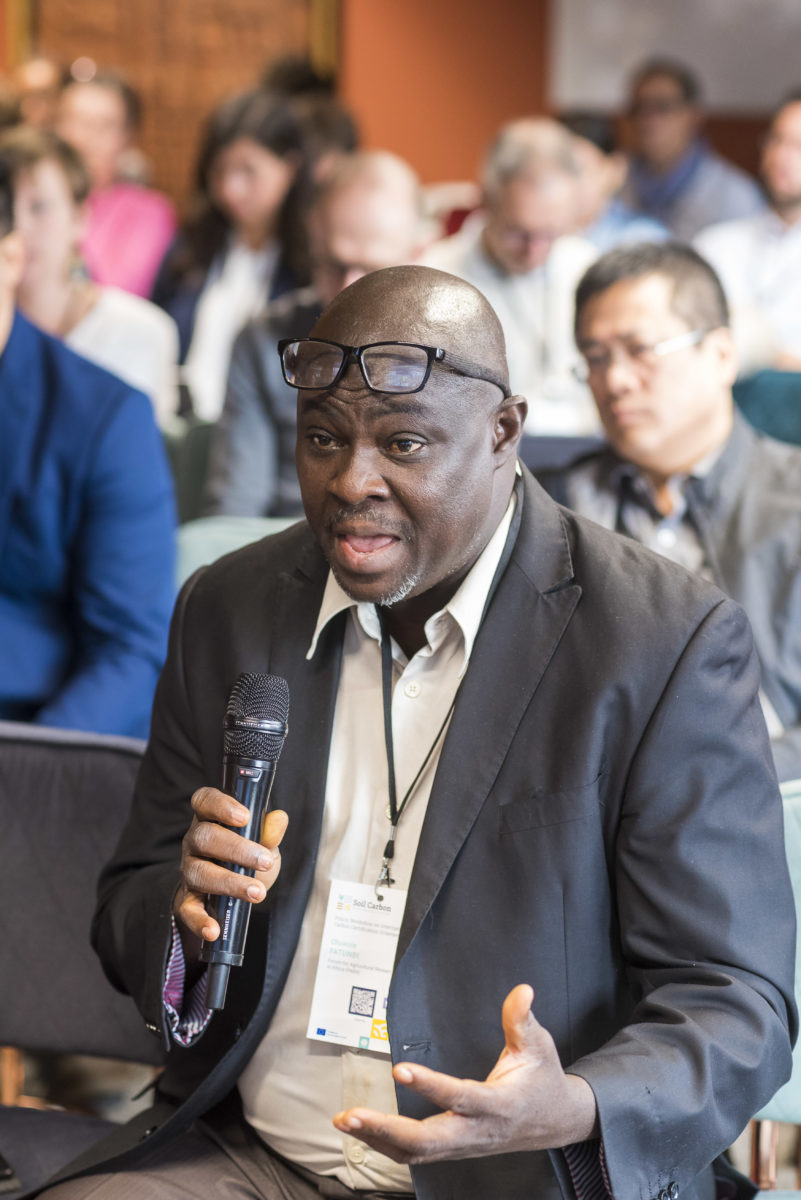‘Elevate Africa’s voice regarding soil health’
Wolé Fatunbi, from the Forum for Agricultural Research in Africa (FARA), represents the Soil Carbon International Research Consortium (IRC) regional ambassador for the African continent. Soil health is a real challenge for food security in Africa and for tackling climate change.
How does Africa’s soil compare to the global context?
Africa’s soil is both unique and fragile, distinguished by its age and long history of transformations. The low mineral content and limited depth contribute to reduced levels of organic matter, while the clay minerals found in these soils are mostly low-activity types, which further limits fertility.
Despite these challenges, African soil has the potential to be productive, but it requires careful management practices. Many farming techniques employed in other regions, particularly mechanised plowing, are often unsuitable for African soils. Such practices can disrupt the delicate balance of nutrients and organic matter, deteriorating the existing soil issues. Furthermore, heavy rainfall events can wash away the scarce remaining organic matter, further depleting the soil’s quality.
Soil health in Africa also plays a critical role in ecological functions, such as carbon sequestration, which is essential for combating climate change. When soil is mismanaged, it loses its ability to store carbon, which can intensify climate impacts while simultaneously reducing agricultural productivity. This creates a cycle that threatens both food security and environmental sustainability.
What is FARA researching in Africa in terms of soil biodiversity and sustainable management?
Maintaining soil biodiversity is one of the leading challenges facing Africa, as it is crucial for sustaining healthy ecosystems. Forest soils, for example, have developed intricate microclimates over centuries, supporting a diverse array of microorganisms, fauna, and flora. When these soils are exposed to agricultural activities or urban development, this balance is disrupted, leading to soil degradation.
The loss of microbial diversity poses a significant risk. Without sufficient microbial life, organic matter cannot effectively break down, and nutrients cannot be properly recycled back into the soil. In light of this, Africa is increasingly interested in biofertilisers. They work to support microbial populations and enhance soil fertility by promoting nutrient cycling alongside traditional mineral fertilisers.
Another innovative solution being explored is the use of biochar, a carbon-rich material that can improve soil moisture retention and fertility. While biochar itself does not contain nutrients, it can significantly enhance the effectiveness of organic and mineral amendments, making it an important tool in sustainable soil management practices.
It is important to address the misconception that Africa should completely avoid fertilisers. While fertilisers carry a stigma, FARA is actively working on researching bio-based solutions like biochar to offer scientific alternatives. FARA’s role, in coordination with the African Union Commission, is to provide evidence-based research that can guide policy development and inform public opinion to ensure food security and improve livelihoods across the continent.
What’s the role of the regional ambassador for Africa and its involvement in the Soil Carbon IRC?
The ORCaSa project is important for Africa, particularly concerning soil carbon management. As the regional ambassador for Africa, FARA is working to ensure that African stakeholders are actively involved in the Soil Carbon IRC [more than 34 signatories from 18 African countries have expressly shown their interest in joining the IRC]. Though the IRC is still in its emerging stages, there is significant interest among stakeholders. Many are eager to join and contribute, but sustaining this interest requires ongoing activities that demonstrate clear benefits. Forming an alliance is insufficient; African stakeholders need tangible evidence of how their involvement will positively impact their work.
One of our primary goals is to connect the Soil Carbon IRC’s activities with existing frameworks on the continent, such as the African Union’s Soil Initiative and the 10-Year Fertiliser and Soil Health Action Plan. These long-term frameworks are critical for ensuring that the Soil Carbon IRC remains active and impactful beyond the lifespan of the ORCaSa project, which is set to conclude in 2025.

What are your objectives and key milestones for the Soil Carbon IRC in Africa moving forward?
We aim to prioritise strategic engagement. By offering stakeholders opportunities to present research, publish findings, and collaborate on projects, we want to encourage motivation and ensure ongoing participation in the Soil Carbon IRC.
We are working to build partnerships between African researchers and their counterparts in other regions. These exchanges of knowledge and resources are highly valued. I have hope that it will strengthen the Soil Carbon IRC and address Africa’s soil health challenges more effectively.
What does FARA gain from participating in the Soil Carbon IRC and the ORCaSa project?
The ORCaSa project aligns closely with Africa’s broader objectives of improving soil health and agricultural productivity. It provides an invaluable opportunity to expand partnerships, share knowledge, and learn from other regions. One of the key benefits for Africa is the chance to communicate its specific challenges and needs to a global audience. We hope this exposure will lead to increased access to resources, such as funding from the Green Climate Fund, which remains undervalued by African nations.
Through our involvement in the Soil Carbon IRC, FARA aims to elevate Africa’s voice in international discussions regarding soil health and climate change. By sharing insights into the challenges faced by African farmers and ecosystems, we hope to advocate for targeted interventions that address these issues effectively.
By collaborating with international partners and stakeholders, we want to ensure that Africa’s specific needs are recognised and addressed in the global discourse on soil health and agricultural sustainability. The goal is to foster practical solutions that will enhance soil and agricultural management, ultimately contributing to improved livelihoods for millions of people across the continent.